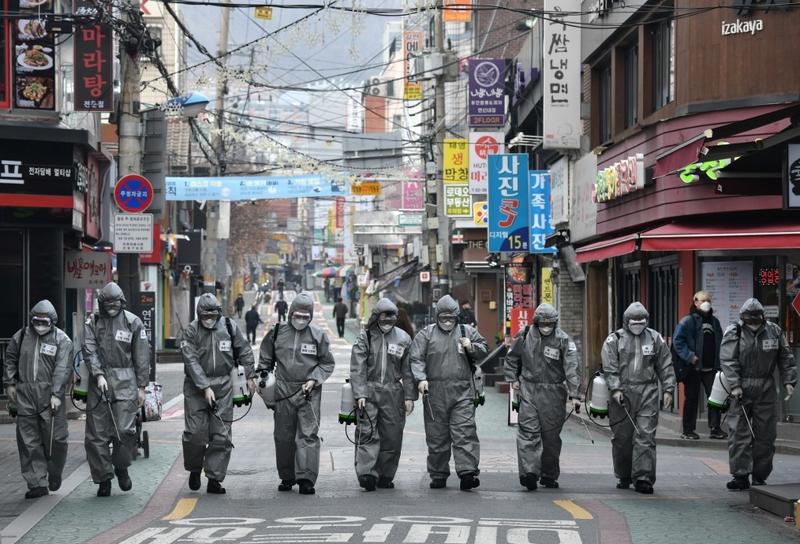 South Korean soldiers wearing protective gear spray disinfectant to help prevent the spread of the COVID-19 coronavirus, at a shopping district in Seoul on March 4, 2020. (JUNG YEON-JE / AFP)
South Korean soldiers wearing protective gear spray disinfectant to help prevent the spread of the COVID-19 coronavirus, at a shopping district in Seoul on March 4, 2020. (JUNG YEON-JE / AFP)
SEOUL - Soldiers, officers, and military doctors and nurses in South Korea have joined the government’s efforts to stop the spread of COVID-19, which has sickened over 7,000 people and killed 50 here, while dealing a severe blow to the local economy and people’s everyday lives.
“Daegu and the immediate North Gyeongsang province are the front lines. The situation is close to war. We need all manpower and resources available to stem the outbreak and to safeguard life and security of the people,” Defense Minister Jeong Kyeong-doo said Friday. Daegu and North Gyeongsang province are the regions that have been hit hardest.
He was encouraging soldiers who were earlier deployed to Daegu International Airport and adjacent areas to carry out decontamination operations.
We do not have enough resources available to disinfect the campus or surrounding regions, but the military can, and that is just reassuring.
Official at Honam University, Gwangju, South Korea
“The military should come forward when called upon during emergencies, and people need us now,” Jeong said.
ALSO READ: Indonesia records first death as S. Korea sees infections jump
The military fielded a highly trained team of experts from the Armed Forces Chemical, Biological and Radiological Defense Command to disinfect hospitals as well as other priority facilities in Daegu.
The anti-weapons of mass destruction command is assisting other municipalities in decontamination work, while other units deployed armored combat vehicles to disinfect larger community areas such as schools.
“We do not have enough resources available to disinfect the campus or surrounding regions, but the military can, and that is just reassuring,” an official at Honam University in Gwangju said after the military decontaminated the campus.
Leading disinfection and sanitation work, however, is only one of the military’s missions in this national struggle.
It is providing medical staff as well as infrastructure for the treatment of patients.
 Military vehicles spray disinfectant on a road near Dongdaegu railway station in Daegu, South Korea, on Feb 29, 2020. (PHOTO / YONHAP / AFP)
Military vehicles spray disinfectant on a road near Dongdaegu railway station in Daegu, South Korea, on Feb 29, 2020. (PHOTO / YONHAP / AFP)
Last week, the entire graduating class from its nursing officers’ training center embarked on its first mission at a military hospital in Daegu, which the government recently designated as a treatment center for COVID-19 patients. The nurses were joined by incoming military doctors.
“Patients come before me,” said nursing officer Lieutenant Kim Seul-gi at the graduation ceremony.
Just in time for the arrival of the extra medical staff, soldiers had helped expand the 98-bed facility into a 303-bed hospital with more negative pressure rooms to speed up the efforts to contain infections there.
Meantime, soldiers are working on weekends to help ramp up the production of protective masks, as the highly contagious respiratory virus trigged a massive surge in demand.
READ MORE: S. Korea urges cooperation as epidemic rages across region
With factories scrambling to fill orders and shops selling out, soldiers are putting in extra hours to help manufacturers cope.
“We were running a little short of labor here, unable to deliver the masks to where needed. But these soldiers, they came out on weekends and were of great help to make that happen,” said a factory supervisor who works for an Incheon-based protective gear firm.
Service members are also giving blood after steps to curb the spread of the virus resulted in a sharp drop in the emergency blood supply. The military said all its service members would continue to donate blood until a stable supply is achieved.
“Humble and committed, we carry out our mission for the people and country. Let this donation be the seed of hope to share,” said General Hwang In-kwon of the Second Operational Command.


